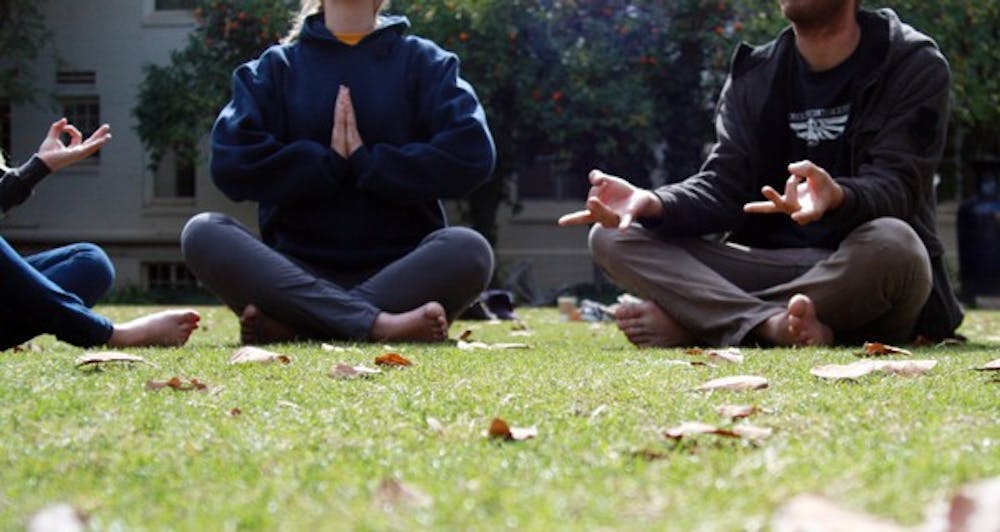Shoes lined the outside border of multi-colored mats. The room echoed with the pounding of fists against punching bags.
Y.W., a senior studying industrial design, sat silently in the corner with her legs crossed in front of her. She just finished her meditation for Falun Dafa, also known as Falun Gong.
“It is a Chinese-Asian meditation practice which was founded on the principles of truthfulness, compassion and forbearance,” Y.W. said.
Y.W. said Falun Dafa has helped her in everyday life at ASU and said the meditation helps her look at a problem and overcome it.
“It’s totally different from most people who blame each other,” she said. “Through time, I get less angry, get less emotional.”
Y.W. is also an international student from China, and said she came to the U.S. because she didn’t want to live in fear anymore. Y.W. said the Chinese government, controlled by the Chinese Communist Party, started getting suspicious of Falun Dafa in 1999 because of the large following it had gained.
“There is a joke that is if 100 million people love Taylor Swift in America, that would be a very normal thing,” she said. “If that happened in China, it could be dangerous because it’s definitely something out of control. China is under the communist rule, so they don’t want something to go viral, like wildfire.”
Falun Dafa was introduced to the public in 1992 by Master Li Hongzhi. Millions of Chinese people were practicing this type of meditation because they believed it had dramatic mental and physical health benefits. Y.W. also said many cities would have public areas for this self-cultivation practice. She referred to the practice as self-cultivation because there was no specific place like a church or a temple for this meditation.
“People just do it at home or outside,” she said. “It’s very free. People are free to come and to go. That’s how it went before the persecution, before 1999.”
The Chinese government started persecuting these meditators in 1999.
“They sent them to jail, to labor camps, to detention camps,” she said. “And there is no law in China that says ‘oh you cannot do this.’”
Y.W. said the Chinese government created a staged performance where fake Falun Dafa supporters threw fire on themselves. She said they did this to make propaganda against the meditators by portraying them as a cult. Y.W. said she was first introduced to Falun Dafa when she watched her mother meditate at home.
However, when she went to school in China she said she received tests with questions like “Is Falun Dafa a cult?” or “Do Falun Dafa practitioners eat their babies?” Y.W. said her mother spoke on behalf of Falun Dafa, telling people that this propaganda was false. She said because of this, policemen searched her home and took anything to do with Falun Dafa.
Y.W. also said her mother was in a detention camp for 15 days and then sent to a brainwash center where she was forced to watch “brainwash videos” and slander Falun Dafa for 17 days.
“She became mentally destructed,” she said.
Y.W. said that after her mother recovered, she restarted learning Falun Dafa, and the police arrested her again, holding her for only one day and sent to the same brainwash center.
“Sometimes she found she was also followed by strangers,” she said. “Her brothers and sisters and my dad were threatened by the policemen.”
Y.W. started her journey in America in January 2013.
“The moment I landed in America, I just took a deep breath because it feels so much different to have that freedom,” she said.
Y.W. said she received support at ASU and that helped her mother get a visitor visa in August 2013.
“We reunited here in the U.S. where we gained the freedom that we never had in China,” she said.
One of the causes Y.W. said she supports and promotes is ending forced organ harvesting because many of the organs come from previously healthy and living Falun Dafa meditators.
“This is a genocide happening in China,” she said. “Millions of Falun Gong people killed to harvest organs.”
Danshan Feng, an ASU alumna, said Falun Dafa improved her life when she started learning in 1997.
“When I was five, I decided to learn it when my mom brought a Falun Dafa book home,” she said. “She decided to learn it after her coworker told her it will improve her daughter’s health.”
Feng said the meditation made her a better person because she started using truthfulness, compassion and tolerance as her life principles.
“I decided to learn it because I liked it and felt the values Falun Dafa shows are beautiful,” she said.
Feng wrote for Friends of Falun Gong and told her story about how her mother suffered in labor camps for years and just barely survived live organ harvesting. Gautham Shankar Ayyapessur, a graduate student studying mechanical engineering, stumbled across the Falun Dafa club four weeks ago.
“I think it means peace, and every time I practice it, I am more peaceful,” he said. “It acts like a stress buster from all these studies and grades.”
Ayyapessur said he meditates for 30 minutes, and it helps him immensely.
“It reduces the stress,” he said. “It increases my concentration on my studies.”
Ayyapessur said people should have the freedom to practice Falun Dafa whenever they want.
"I think it is really unfair for the government to persecute people just because Falun Gong has gained huge popularity," he said. "It is really pathetic."
Editor's Note: This story was updated on Oct. 13, 2021, to remove the name of one of the students and replace it with their initials for protective safety measures. The story was also updated with a new photo to protect the student's identity.
Reach the reporter at anbuechl@asu.edu or follow @alexa_buechler on Twitter.
Like The State Press on Facebook and follow @statepress on Twitter.




